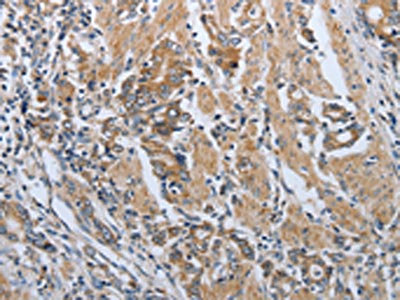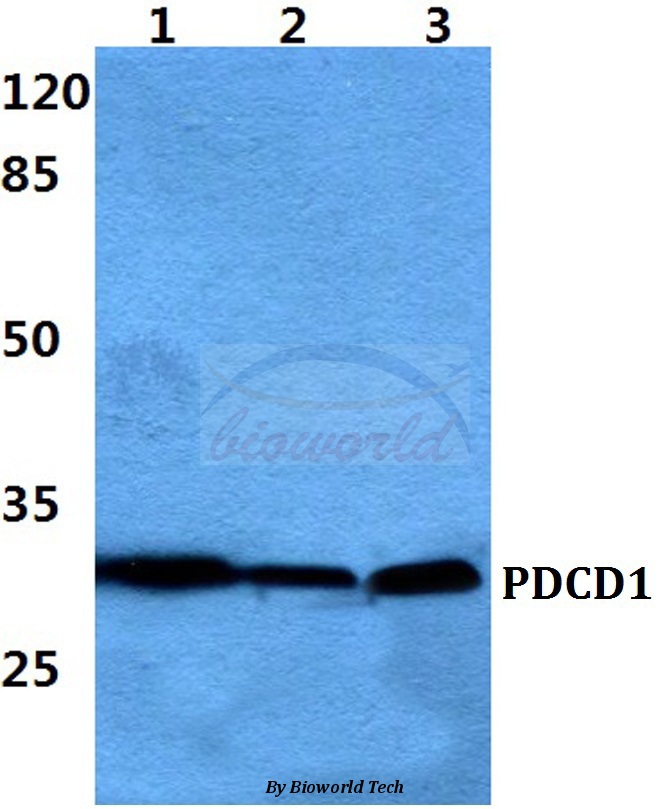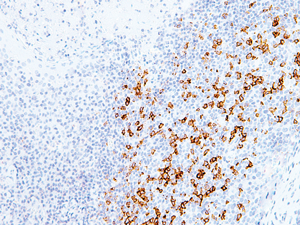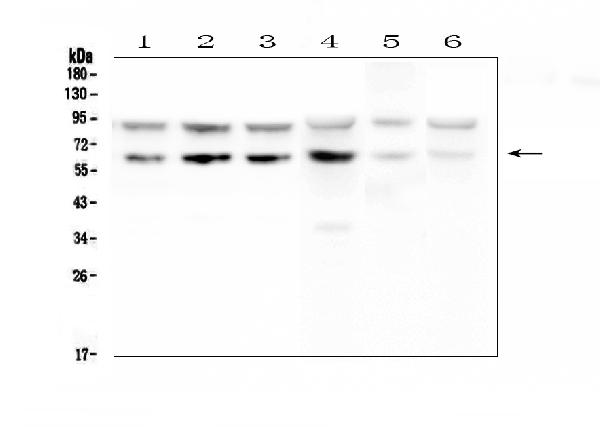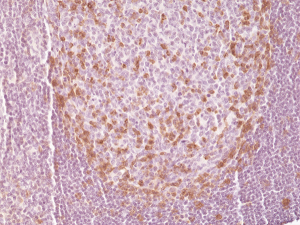
Immunohistochemical staining of formalin fixed and paraffin embedded human tonsil tissue section using anti-PD-1 rabbit monoclonal antibody (Clone RM309) at a 1:500 dilution.
anti-PD-1 (human), Rabbit Monoclonal (RM309)
REV-31-1195-00
ApplicationsWestern Blot, ImmunoHistoChemistry
Product group Antibodies
ReactivityHuman
TargetPDCD1
Overview
- SupplierRevMAb Biosciences
- Product Nameanti-PD-1 (human), Rabbit Monoclonal (RM309)
- Delivery Days Customer2
- ApplicationsWestern Blot, ImmunoHistoChemistry
- CertificationResearch Use Only
- ClonalityMonoclonal
- Clone IDRM309
- Gene ID5133
- Target namePDCD1
- Target descriptionprogrammed cell death 1
- Target synonymsADMIO4, AIMTBS, CD279, PD-1, PD1, SLEB2, hPD-1, hPD-l, hSLE1, programmed cell death protein 1, programmed cell death 1 protein, protein PD-1, systemic lupus erythematosus susceptibility 2
- HostRabbit
- IsotypeIgG
- Protein IDQ15116
- Protein NameProgrammed cell death protein 1
- Scientific DescriptionProgrammed Death 1 (PD-1) is a member of the CD28/CTLA-4 family of T cell regulators, expressed as a co-receptor on the surface of activated T cells, B cells and macrophages. Several studies have suggested that the PD-1/PD-L1 signaling pathway may be linked to antitumor immunity, as PD-L1 has been shown to induce apoptosis of activated T cells or inhibit activity of cytotoxic T cells. In comparison to CD10 and Bcl-6, PD-1 is expressed by fewer B cells and has therefore been considered a more specific and useful diagnostic marker for angioimmunoblastic T cell lymphoma. Therapies targeted toward the PD-1 receptor have shown remarkable clinical responses in patients with various types of cancer, including non-small-cell lung cancer, melanoma and renal-cell cancer. - Recombinant Antibody. This antibody reacts to human PD-1 (Programmed cell death protein 1) (CD279). Applications: WB, IHC. Source: Rabbit. Liquid. 50% Glycerol/PBS with 1% BSA and 0.09% sodium azide. Programmed Death 1 (PD-1) is a member of the CD28/CTLA-4 family of T cell regulators, expressed as a co-receptor on the surface of activated T cells, B cells and macrophages. Several studies have suggested that the PD-1/PD-L1 signaling pathway may be linked to antitumor immunity, as PD-L1 has been shown to induce apoptosis of activated T cells or inhibit activity of cytotoxic T cells. In comparison to CD10 and Bcl-6, PD-1 is expressed by fewer B cells and has therefore been considered a more specific and useful diagnostic marker for angioimmunoblastic T cell lymphoma. Therapies targeted toward the PD-1 receptor have shown remarkable clinical responses in patients with various types of cancer, including non-small-cell lung cancer, melanoma and renal-cell cancer.
- ReactivityHuman
- Storage Instruction-20°C,2°C to 8°C
- UNSPSC41116161

